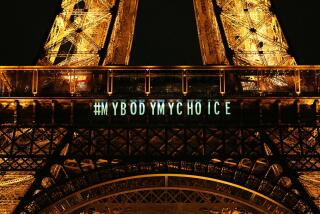Swiss ban on minarets roils Europe
- Share via
Reporting from Paris — The decision by Swiss voters to ban minarets on Muslim houses of worship resonated across neighboring France on Monday, stoking an already emotional debate on whether burkas should be banned in public and coloring a government-sponsored debate over what it means to be French.
Commentators and officials in France and across Europe took sides Monday on the surprise Swiss decision, passed in a referendum the previous day. French lawmakers who support banning the burka, the all-covering garment worn by some Muslim women, defended themselves against accusations that the move would fuel a growing phobia against Islam in Europe.
French Socialist Party spokesman Benoit Hamon said the Swiss decision in effect blamed Muslims for “all of Western society’s ills,” and compared it to the three-month-long public debates on French identity spearheaded by conservative President Nicolas Sarkozy.
“I regret that the president is surrendering himself to this type of stigmatization of foreigners and immigrants by associating national identity and immigration,” Hamon said on RTL French radio.
Immigration Minister Eric Besson, who is organizing the nationwide debates, said the Swiss ban on minarets stigmatized Islam. Instead, he said, “We need to favor the emergence of a French Islam that integrates into the values of the republic.”
He added that trying to ban the burka was not comparable because “it affects a woman’s dignity.” In comments to French media, Xavier Bertrand, general secretary of Sarkozy’s political party, referred to the burka as a “prison.”
After Sarkozy said this summer that the burka was “not welcome in France,” a parliamentary panel has been studying whether it should be banned. Meanwhile, the debate over French identity is being conducted through town hall meetings and Internet forums.
Sarkozy’s opponents see the debate on French identity as an effort to woo right-wing voters by talking about French values, how to show pride in being French and why foreigners must be integrated into society.
Across Europe on Monday, debate raged over the Swiss referendum, which bans construction of minarets, but allows those already built to remain. It does not block construction of new mosques.
Bernard Kouchner, the French foreign minister, equated banning minarets with oppressing a religion. The Vatican said that Christians needed to know how to overcome feelings of “aversion and fear” of others.
But the Belgian newspaper Le Soir noted that some people found minarets “scary,” and added, “There is a strong chance that if there was a vote in Belgium, a majority of citizens would be against it too.”
In a statement on the Swiss vote, Thomas Hammarberg, the Council of Europe’s commissioner for human rights, warned against narrowly defining national identity and pinpointed France’s debate as a potential “trap of promoting one single identity, which defines who is included and, by extension, who is excluded.”
Others said the Swiss vote would lift the lid off French anxiety about Islam, and would give free rein to ultranationalist and anti-immigrant voices.
The Swiss vote proved there is significant popular support for tougher measures against Islam, said Jean Viard, head of the Cevipof French political science research center.
“Deep down, many French don’t want more mosques in France,” he said, and the Swiss vote may stir those feelings.
While most French lawmakers were vocal in criticizing the Swiss vote, some right-leaning politicians showed sympathy for the Swiss decision.
UMP party speaker Dominique Paillé told France Inter radio he wasn’t persuaded that minarets were necessary on mosques in France.
Lauter is a special correspondent.
More to Read
Sign up for Essential California
The most important California stories and recommendations in your inbox every morning.
You may occasionally receive promotional content from the Los Angeles Times.










